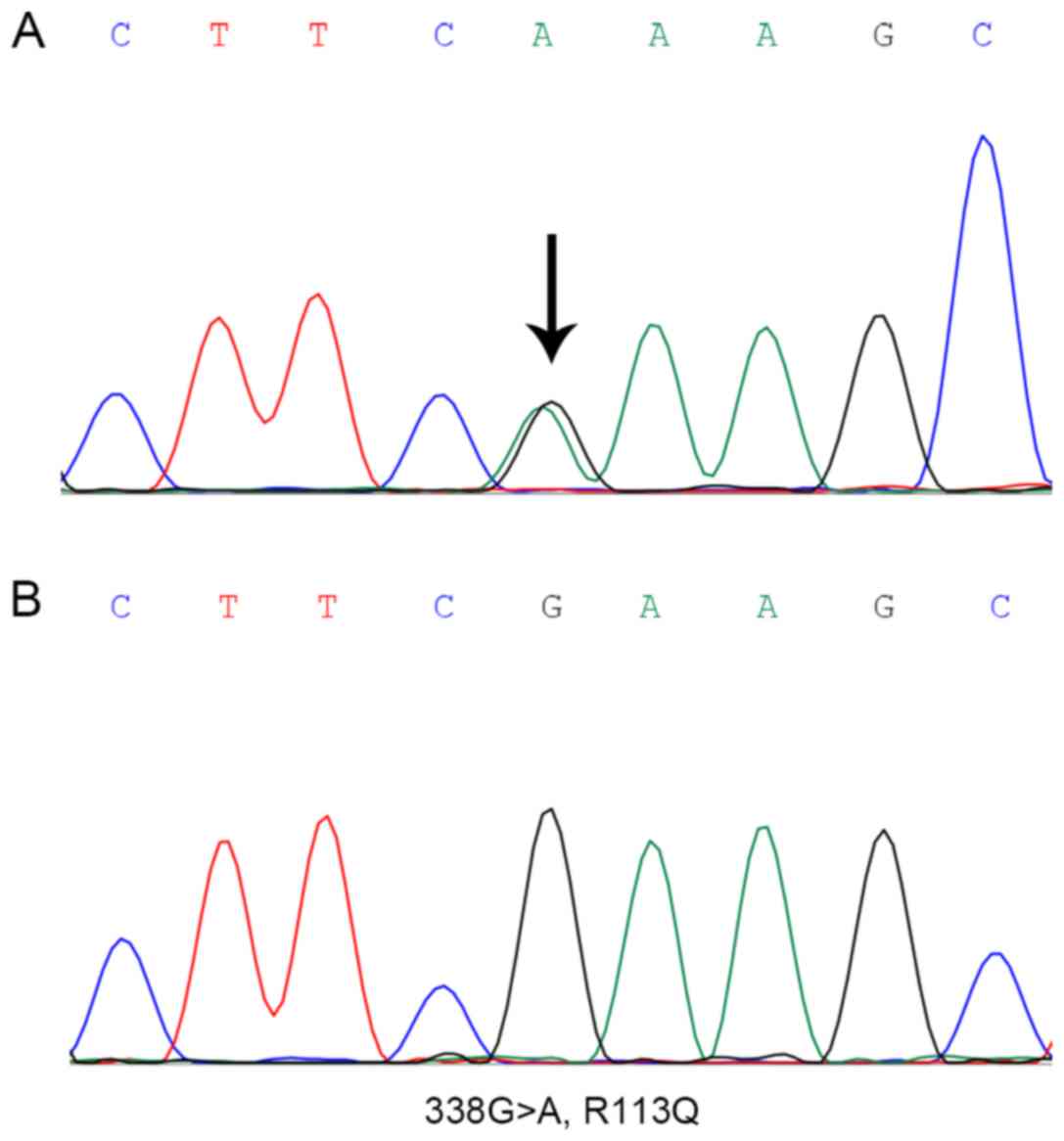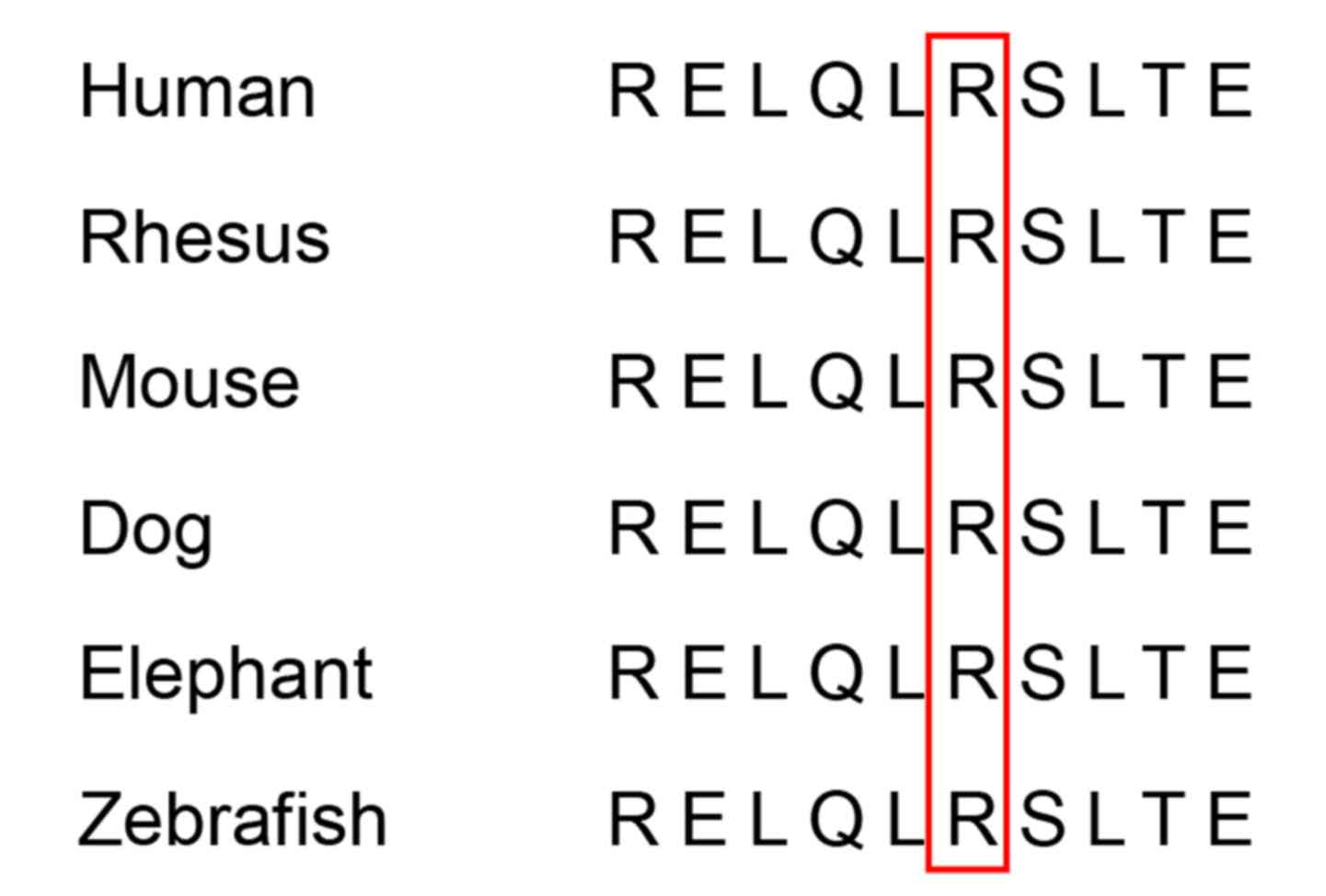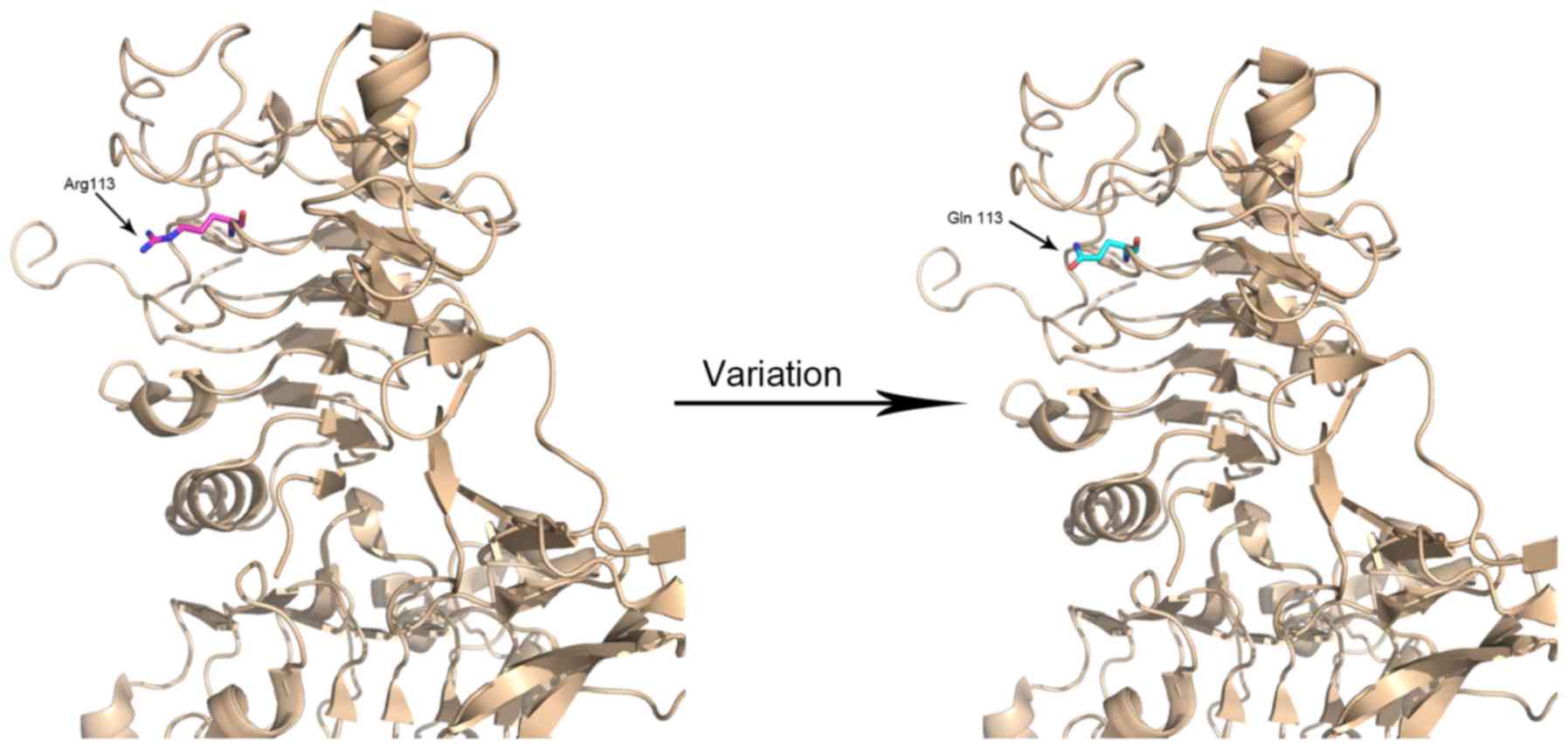|
1
|
Ferlay J, Soerjomataram I, Dikshit R, Eser
S, Mathers C, Rebelo M, Parkin DM, Forman D and Bray F: Cancer
incidence and mortality worldwide: Sources, methods and major
patterns in GLOBOCAN 2012. Int J Cancer. 136:E359–E386. 2015.
View Article : Google Scholar : PubMed/NCBI
|
|
2
|
Kleibl Z and Kristensen VN: Women at high
risk of breast cancer: Molecular characteristics, clinical
presentation and management. Breast. 28:136–144. 2016. View Article : Google Scholar : PubMed/NCBI
|
|
3
|
Kuchenbaecker KB, Hopper JL, Barnes DR,
Phillips KA, Mooij TM, Roos-Blom MJ, Jervis S, van Leeuwen FE,
Milne RL, Andrieu N, et al: Risks of breast, ovarian, and
contralateral breast cancer for BRCA1 and BRCA2 mutation carriers.
JAMA. 317:2402–2416. 2017. View Article : Google Scholar : PubMed/NCBI
|
|
4
|
Economopoulou P, Dimitriadis G and Psyrri
A: Beyond BRCA: New hereditary breast cancer susceptibility genes.
Cancer Treat Rev. 41:1–8. 2015. View Article : Google Scholar : PubMed/NCBI
|
|
5
|
Liede A and Narod SA: Hereditary breast
and ovarian cancer in Asia: Genetic epidemiology of BRCA1 and
BRCA2. Hum Mutat. 20:413–424. 2002. View Article : Google Scholar : PubMed/NCBI
|
|
6
|
Negri E, Braga C, La Vecchia C, Franceschi
S and Parazzini F: Family history of cancer and risk of breast
cancer. Int J Cancer. 72:735–738. 1997. View Article : Google Scholar : PubMed/NCBI
|
|
7
|
Parazzini F, La Vecchia C, Negri E,
Franceschi S and Tozzi L: Family history of breast, ovarian and
endometrial cancer and risk of breast cancer. Int J Epidemiol.
22:614–618. 1993. View Article : Google Scholar : PubMed/NCBI
|
|
8
|
Zhou W, Ding Q, Pan H, Wu N, Liang M,
Huang Y, Chen L, Zha X, Liu X and Wang S: Risk of breast cancer and
family history of other cancers in first-degree relatives in
Chinese women: A case control study. BMC Cancer. 14:6622014.
View Article : Google Scholar : PubMed/NCBI
|
|
9
|
Schettini F, Buono G, Cardalesi C,
Desideri I, De Placido S and Del Mastro L: Hormone receptor/human
epidermal growth factor receptor 2-positive breast cancer: Where we
are now and where we are going. Cancer Treat Rev. 46:20–26. 2016.
View Article : Google Scholar : PubMed/NCBI
|
|
10
|
Ellis MJ, Ding L, Shen D, Luo J, Suman VJ,
Wallis JW, Van Tine BA, Hoog J, Goiffon RJ, Goldstein TC, et al:
Whole-genome analysis informs breast cancer response to aromatase
inhibition. Nature. 486:353–360. 2012. View Article : Google Scholar : PubMed/NCBI
|
|
11
|
Bose R, Kavuri SM, Searleman AC, Shen W,
Shen D, Koboldt DC, Monsey J, Goel N, Aronson AB, Li S, et al:
Activating HER2 mutations in HER2 gene amplification negative
breast cancer. Cancer Discov. 3:224–237. 2013. View Article : Google Scholar : PubMed/NCBI
|
|
12
|
Greulich H, Kaplan B, Mertins P, Chen TH,
Tanaka KE, Yun CH, Zhang X, Lee SH, Cho J, Ambrogio L, et al:
Functional analysis of receptor tyrosine kinase mutations in lung
cancer identifies oncogenic extracellular domain mutations of
ERBB2. Proc Natl Acad Sci USA. 109:14476–14481. 2012. View Article : Google Scholar : PubMed/NCBI
|
|
13
|
Kumar P, Henikoff S and Ng PC: Predicting
the effects of coding non-synonymous variants on protein function
using the SIFT algorithm. Nat Protoc. 4:1073–1081. 2009. View Article : Google Scholar : PubMed/NCBI
|
|
14
|
Adzhubei I, Jordan DM and Sunyaev SR:
Predicting functional effect of human missense mutations using
PolyPhen-2. Curr Protoc Hum Genet. 7:Unit7 20. 2013.PubMed/NCBI
|
|
15
|
Schwarz JM, Cooper DN, Schuelke M and
Seelow D: MutationTaster2: Mutation prediction for the
deep-sequencing age. Nat Methods. 11:361–362. 2014. View Article : Google Scholar : PubMed/NCBI
|
|
16
|
Davydov EV, Goode DL, Sirota M, Cooper GM,
Sidow A and Batzoglou S: Identifying a high fraction of the human
genome to be under selective constraint using GERP++. PLoS Comput
Biol. 6:e10010252010. View Article : Google Scholar : PubMed/NCBI
|
|
17
|
Liu X, Jian X and Boerwinkle E: dbNSFP
v2.0: A database of human non-synonymous SNVs and their functional
predictions and annotations. Hum Mutat. 34:E2393–E2402. 2013.
View Article : Google Scholar : PubMed/NCBI
|
|
18
|
DeLano WL: PyMOL: An open-source molecular
graphics tool. CCP4 Newsletter On Protein Crystallography.
40:82–92. 2002.
|
|
19
|
Kent WJ, Sugnet CW, Furey TS, Roskin KM,
Pringle TH, Zahler AM and Haussler D: The human genome browser at
UCSC. Genome Res. 12:996–1006. 2002. View Article : Google Scholar : PubMed/NCBI
|
|
20
|
Wigginton JE, Cutler DJ and Abecasis GR: A
note on exact tests of Hardy-Weinberg equilibrium. Am J Hum Genet.
76:887–893. 2005. View
Article : Google Scholar : PubMed/NCBI
|
|
21
|
1000 Genomes Project Consortium, Auton A,
Brooks LD, Durbin RM, Garrison EP, Kang HM, Korbel JO, Marchini JL,
McCarthy S, McVean GA and Abecasis GR: A global reference for human
genetic variation. Nature. 526:68–74. 2015. View Article : Google Scholar : PubMed/NCBI
|
|
22
|
Tao W, Wang C, Han R and Jiang H: HER2
codon 655 polymorphism and breast cancer risk: A meta-analysis.
Breast Cancer Res Treat. 114:371–376. 2009. View Article : Google Scholar : PubMed/NCBI
|
|
23
|
Lu S, Wang Z, Liu H and Hao X: HER2
Ile655Val polymorphism contributes to breast cancer risk: Evidence
from 27 case-control studies. Breast Cancer Res Treat. 124:771–778.
2010. View Article : Google Scholar : PubMed/NCBI
|
|
24
|
Millikan R, Eaton A, Worley K, Biscocho L,
Hodgson E, Huang WY, Geradts J, Iacocca M, Cowan D, Conway K and
Dressler L: HER2 codon 655 polymorphism and risk of breast cancer
in African Americans and whites. Breast Cancer Res Treat.
79:355–364. 2003. View Article : Google Scholar : PubMed/NCBI
|
|
25
|
Yamamoto H, Higasa K, Sakaguchi M, Shien
K, Soh J, Ichimura K, Furukawa M, Hashida S, Tsukuda K, Takigawa N,
et al: Novel germline mutation in the transmembrane domain of HER2
in familial lung adenocarcinomas. J Natl Cancer Inst.
106:djt3382014. View Article : Google Scholar : PubMed/NCBI
|
|
26
|
Brennan PJ, Kumagai T, Berezov A, Murali R
and Greene MI: HER2/Neu: Mechanisms of
dimerization/oligomerization. Oncogene. 21:3282002. View Article : Google Scholar : PubMed/NCBI
|
|
27
|
Penuel E, Akita RW and Sliwkowski MX:
Identification of a region within the ErbB2/HER2 intracellular
domain that is necessary for ligand-independent association. J Biol
Chem. 277:28468–28473. 2002. View Article : Google Scholar : PubMed/NCBI
|
|
28
|
Chantry A: The kinase domain and membrane
localization determine intracellular interactions between epidermal
growth factor receptors. J Biol Chem. 270:3068–3073.
1995.PubMed/NCBI
|
|
29
|
Hu S, Sun Y, Meng Y, Wang X, Yang W, Fu W,
Guo H, Qian W, Hou S, Li B, et al: Molecular architecture of the
ErbB2 extracellular domain homodimer. Oncotarget. 6:1695–1706.
2015. View Article : Google Scholar : PubMed/NCBI
|

















